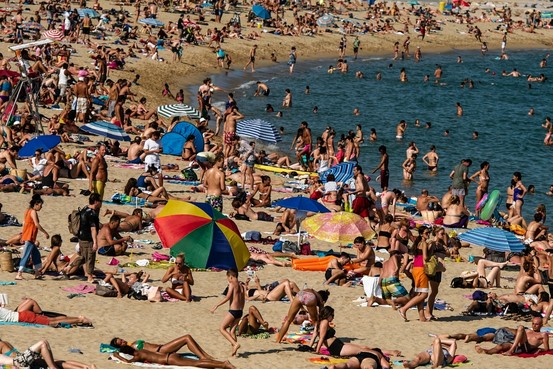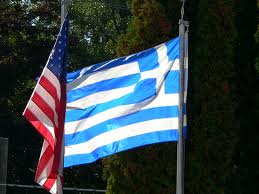By ILAN BRAT in Cambrils, Spain, and ALKMAN GRANITSAS in Athens, The Wall Street Journal
The Russians came, and they saved hotelier Gustavo Cabedo's tourist season. Spanish visitors to his Tryp Port Cambrils hotel, down the coast from Barcelona, had dwindled in recent years as the economy slumped. But a rush of Russian and French tourists put off by turmoil in Egypt—and lured to Spain by falling prices—has picked up the slack, lifting occupancy in the 156-room hotel near the beach above 90% this summer.
The growth in international tourism "has been vital," said Mr. Cabedo, the hotel's general manager. "I don't wish anyone harm, but problems in North Africa have been good for Spain."
Tourists have been flocking this year to the euro zone's "Club Med" vacation spots, boosting struggling economies. Foreign visits to Spain since January have set a record, while Greece and Portugal are enjoying banner years.
International tourist arrivals in Southern Europe grew 6% in the first half of the year over the same period of 2012, a percentage point above the global increase, according to the U.N. World Tourism Organization.
In the previous decade, relative stability and new hotel development helped Egypt and other North African countries compete for tourists seeking sun, sand and cultural attractions, industry analysts say.
But falling prices in the euro-zone periphery—hotel rates in Spain are down around 10% since 2008, according to official statistics—and the continuing political upheaval that began in the Arab Spring of 2011 has made the Mediterranean's northern shores look more attractive.
Cruise-ship operators are adding six Greek ports to their routes this year and next as they cancel planned port calls in Egypt. The Finnish tour operator Finnmatkat canceled trips to Egypt for more than 20,000 people this coming winter, offering to route them to Spain's Canary Islands and elsewhere.
The tourist boom underscores how economic restructuring is helping Southern European countries regain international competitiveness.
In Greece, labor-market changes have helped cut payrolls—which account for about 40% of a hotel's operating costs—pushing down average wage bills by a fifth. That has translated into an average 8% reduction in hotel rates in the last year, according to industry sources.
In Portugal, where the Atlantic Algarve region entices hordes of British visitors, prices for hotels and other services declined while spending by foreign tourists rose 8.2%, to €3.7 billion ($4.9 billion), in the first half of the year over the same period in 2012.
To be sure, tourist spending is too small on its own to end Southern Europe's recession or sustain a recovery.
Still, it could make the recession shallower than forecast for this year and hasten a return to growth, said Sara Baliña, a partner at Madrid-based economic analysis firm Analistas Financieros Internacionales SA. It is "an important stabilizing factor" for Southern European economies, she said.
A peace dividend of sorts is lifting Greece's tourist industry. Fears of an abrupt Greek exit from the euro zone have receded in the past year. The violent antiausterity protests that rocked Athens at the start of the crisis and frightened away would-be visitors have petered out.
Carsten Palvig, a 62-year-old Danish information technology developer, a frequent visitor for more than three decades, said Greece's turmoil kept him away for the past few years "but we thought we would try it again this year."
He spoke as his companion photographed the 19th century neoclassical buildings that line the alleyways of Athens's Plaka tourist quarter. "You can't really see any sign of the crisis here."
A few steps away, Margaret Smith perused tourist shops beneath the Acropolis. The-49 year-old real estate agent from Virginia had organized a 10-day trip with half a dozen friends to Crete and the Greek capital.
"Who doesn't want to come to Greece anyway?" she said. "But the low prices were an extra inducement."
The Greek government has over the past few years eased visa restrictions for various countries, including traditional rival Turkey, helping to draw new visitors.
Tourist arrivals and spending in Greece are surpassing even the optimistic forecasts at the start of the year. The latest data suggests that a record 17.5 million visitors will spend €11.5 billion this year, industry sources said.
In Spain, regional and central governments also have been trying to attract tourists from beyond the usual sources—Britain, Germany and France—by, for example, sending delegations to tourism fairs in Russia. Visits from Nordic countries and Russia through July of this year grew 18% and 31%, respectively, over the same period in 2012.
In Cambrils, a fishing port with 30,000 permanent residents, foreign tourist overnight stays since January hit a record despite a 20-percentage-point decline in Spanish visits. Russian nationals accounted for 13% of July occupancy this year, compared with nearly none in 2009, according to the local tourism board.
Businesses are hiring Russian speakers. The Michelin-starred Can Bosch Restaurant offers a Russian-language menu. Cyrillic script covers signs for bicycle rentals and at ice cream shops.
The Tryp Port Cambrils hotel started buying more watermelon a few years ago after the staff noticed Eastern European guests gobbling up the fruit at buffet tables. Mr. Cabedo said his average revenue per room has declined 7% since 2009, in part because he´s offering more promotions.
Vladimir Ovtchinnikoff, a tourist from Moscow who sells tractor parts, said safety concerns about Egypt influenced his family's decision to vacation in Spain. He praised the wide beaches, which workers tidy each morning. He marveled at the cleanliness of the water, despite the proximity of large ships and a chemical plant.
"I see tankers in the sea, but no oil fumes in the water," he said. "It is unbelievable for me."



















